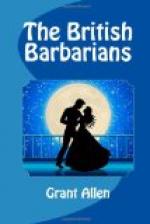Frida had no such fanatical respect for the bogey of vested interests as her superstitious brother, so she mounted the gate gracefully—she was always graceful. Bertram took her small hand and jumped her down on the other side, while Philip, not liking to show himself less bold than a woman in this matter, climbed over it after her, though with no small misgivings. They strolled on into the wood, picking the pretty white orchids by the way as they went, for some little distance. The rich mould underfoot was thick with sweet woodruff and trailing loosestrife. Every now and again, as they stirred the lithe brambles that encroached upon the path, a pheasant rose from the ground with a loud whir-r-r before them. Philip felt most uneasy. “You’ll have the keepers after you in a minute,” he said, with a deprecating shrug. “This is just full nesting time. They’re down upon anybody who disturbs the pheasants.”
“But the pheasants can’t belong to any one,” Bertram cried, with a greatly amused face. “You may taboo the land—I understand that’s done—but surely you can’t taboo a wild bird that can fly as it likes from one piece of ground away into another.”
Philip enlightened his ignorance by giving him off-hand a brief and profoundly servile account of the English game-laws, interspersed with sundry anecdotes of poachers and poaching. Bertram listened with an interested but gravely disapproving face. “And do you mean to say,” he asked at last “they send men to prison as criminals for catching or shooting hares and pheasants?”
“Why, certainly,” Philip answered. “It’s an offence against the law, and also a crime against the rights of property.”
“Against the law, yes; but how on earth can it be a crime against the rights of property? Obviously the pheasant’s the property of the man who happens to shoot it. How can it belong to him and also to the fellow who taboos the particular piece of ground it was snared on?”
“It doesn’t belong to the man who shoots it at all,” Philip answered, rather angrily. “It belongs to the man who owns the land, of course, and who chooses to preserve it.”
“Oh, I see,” Bertram replied. “Then you disregard the rights of property altogether, and only consider the privileges of taboo. As a principle, that’s intelligible. One sees it’s consistent. But how is it that you all allow these chiefs—landlords, don’t you call them?—to taboo the soil and prevent you all from even walking over it? Don’t you see that if you chose to combine in a body and insist upon the recognition of your natural rights,—if you determined to make the landlords give up their taboo, and cease from injustice,— they’d have to yield to you, and then you could exercise your native right of going where you pleased, and cultivate the land in common for the public benefit, instead of leaving it, as now, to be cultivated anyhow, or turned into waste for the benefit of the tabooers?”




